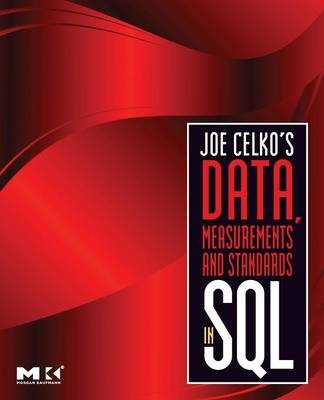
Joe Celko's Data, Measurements and Standards in SQL
Morgan Kaufmann Publishers In (Verlag)
978-0-12-374722-8 (ISBN)
Joe Celko has looked deep into the code of SQL programmers and found a consistent and troubling pattern - a frightening lack of consistency between their individual encoding schemes and those of the industries in which they operate. This translates into a series of incompatible databases, each one an island unto itself that is unable to share information with others in an age of internationalization and business interdependence. Such incompatibility severely hinders information flow and the quality of company data.
Data, Measurements and Standards in SQL reveals the shift these programmers need to make to overcome this deadlock. By collecting and detailing the diverse standards of myriad industries, and then giving a declaration for the units that can be used in an SQL schema, Celko enables readers to write and implement portable data that can interface to any number of external application systems!
This book doesn't limit itself to one subject, but serves as a detailed synopsis of measurement scales and data standards for all industries, thereby giving RDBMS programmers and designers the knowledge and know-how they need to communicate effectively across business boundaries.
Joe Celko served 10 years on ANSI/ISO SQL Standards Committee and contributed to the SQL-89 and SQL-92 Standards. Mr. Celko is author a series of books on SQL and RDBMS for Elsevier/MKP. He is an independent consultant based in Austin, Texas. He has written over 1200 columns in the computer trade and academic press, mostly dealing with data and databases.
0.0.Introduction 1.0.Scales and Measurement Theory 2.0.Data Encoding Schemes 2.1.Classification 2.2.Check Digits 3.0.Physical Measurements3.1.Brief History of Measurement Standards 3.2.Rise of ISO and Other Organizations3.3.ISO-2955 Standard 3.3.1.Basic Units3.3.2.Compound Units3.4.Color Systems4.0.Temporal Measurements 4.1.The Calendar4.1.1.A History of the Common Era Calendar 4.1.2.ISO-8601 Standard 4.1.3.Implementations in SQL 4.2.The Clock4.2.1.Leap Seconds, UTC and Atomic Clocks4.2.2.Time Zones in SQL 5.0.Industry Standards For Products5.1.UPC and EAN Bar Codes5.2.Standard Packaging Units5.2.1.U.S. Systems5.2.2.European Union and Other European Systems 5.2.3.Asian and Other Systems5.3.Bank Standards5.3.1.Account Numbers5.3.2.Checking 5.3.2.1. U.S. Banking System5.3.2.2. IBAN and Other International Standards 6.0.Postal Address Encoding6.1.Formatting Names6.2.ZIP Codes in the United States 6.3.Various Foreign Systems 6.4.Systems Used by UPS and other Delivery Services7.0.Currency 7.1.GAAP Rules in the United States 7.2.Rules for Euro Conversions 8.0.Internet 8.1.Email Addresses8.2.IP Addresses 9.0.Business Codes9.1.The Rise and Fall of EDI and ANSI X129.2.XML Standards in Various Industries 9.3.Company Identifiers 9.3.1.DUNS 9.3.2.Stock Ticker Symbols9.4.Chart of Accounts10.0. Medical Systems10.1. ICD Codes 10.2. HIPAA Codes10.3. Drug Codes11.0. General Classification Systems11.1. Alphabetic Order11.1.1.History11.1.2.Problems with Foreign Alphabets11.2. Dewey Decimal Classification 11.3. Library of Congress
| Verlagsort | San Francisco |
|---|---|
| Sprache | englisch |
| Maße | 191 x 235 mm |
| Gewicht | 550 g |
| Themenwelt | Informatik ► Datenbanken ► SQL Language |
| Informatik ► Datenbanken ► SQL Server | |
| ISBN-10 | 0-12-374722-8 / 0123747228 |
| ISBN-13 | 978-0-12-374722-8 / 9780123747228 |
| Zustand | Neuware |
| Informationen gemäß Produktsicherheitsverordnung (GPSR) | |
| Haben Sie eine Frage zum Produkt? |
aus dem Bereich


